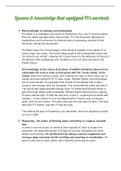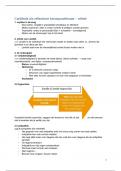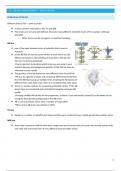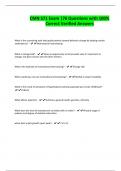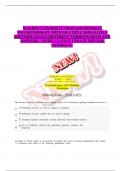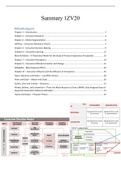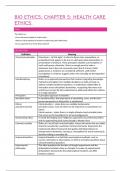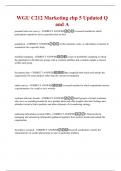1. Parliamentary sovereignty (pg 2)
- Ultimate law-maker, no judicial review, parliament can’t bind
future parliament
The parliament is the most important law-maker. It’s sovereign and supreme
and as such has the ultimate decision-making power.
In Belgium, the Parliament can’t change the constitution without permission
of the previous Parliament. But if the British Parliament wants to do the
same, they can do that by simple majority because the Parliament doesn’t
have competitors in the legal system, they are sovereign. There is only one
Parliament, namely the Parliament in Westminster.
Their legislation is written in very precise language by legal draftsmen and is
therefore not subjected to judicial review by judges. (Parliament wants to
stop/limit judges to give another interpretation of the texts and that’s why
they are so specific.)
2. Statutory interpretation (pg 3)
Statutory interpretation = giving meaning to an act of Parliament.
The highly-skilled work of the parliamentary legal draftsmen is aimed to
make the law clear and to avoid the need for a statutory interpretation.
Howerver, interpretation is often needed for a variety of reasons f.e. change
in meaning of words, mistake in the legislation, unclear wording, …
There are four different rules to interpret legislation:
1. Literal rule
= Using the ordinary and natural meaning of the words. Looking at the
meaning of the actual words. With this method, they only look at certain
words instead of the entire text which is unreasonable.
Case: Fisher v Bell (1961)
James bell displayed a flick knife in his window shop but, according to the
restriction of offensive weapons act, it is an offence to offer certain offensive
weapons for sale, including flick knives. The Divisional Court gave the statute
a literal meaning and therefore concluded that Mr. Bell had not offered the
knife for sale. A technical interpretation of contract law qualifies placing
something in a shop window not as an offer for sale but as an invitation to
treat, the potential customer can then make an offer. The court upheld that
under the literal meaning of “offer”, the shopkeeper had not made an offer
to sell and so was not guilty of the offence. As a result of this judgment, the
Parliament changed the law to make it clear that displaying a flick knife in a
shop window is an offence. (The purpose of this law was offering knives to
sell them directly, but the shopkeeper was not doing that, so he was not
found guilty)
2. Golden rule
= Looking at the words in their context if the literal rule leads to an absurd
result or inconsistency.
, The rule was clearly stated by Lord Wensleydale but even though the
formulation of the rule by Lord Wensleydale makes clear that the golden rule
should only be applied to avoid an absurdity or inconsistency in the
interpretation, there is no test to determine what is an absurdity. This allows
some flexibility of the judges.
Case: R v Allen (1872)
Section 57 of the offences against the person act defined bigamy as being
married more than once. If you are already married, you cannot lawfully
marry again, so technical you cannot commit the offence. The second or
third marriage will never be legal and therefore you would not be able to
commit the offence of bigamy according to the literal rule interpretation.
This interpretation would be absurd so the court applied the golden rule and
held that the word ‘marry’ means: to go through the ceremony of marriage.
You are pretending to marry again and go through the ceremony again so in
society you are committing the crime. On this ground, the court stated that
Allen was convicted.
3. Mischief rule
= For statutes dealing with a problem or lack of a rule in the common law.
Judes make up legal rules themselves to deal with the problem.
Case: Smith v Hughes (‘Prostitute’)
The street offences act referred to prostitutes soliciting in a street or public
place. In the Smith v Hughes case one prostitute offered her services from
the balcony of a house and another from a downstairs window. This meant
they were not in a public place but in a private residence so the mischief (=
het problem) in this act was it only refers to prostitution in a public place.
Judges were trying to stop prostitutions so the literally interpretation was not
satisfying because it did not solve the problem. The judges wanted the
section to be included in the term ‘prostitution’ so they stated that it was
nog really a public place, but the prostitutes are interacting with the public in
a public place. They are finding their clients through interaction in a public
place. By applying the mischief rule, it could be seen that the invitation of
the prostitutes was addressed to someone walking in the street and therefor
the prostitutes were guilty of the offence of soliciting in a public place.
4. Purposive approach
= The use of extrinsic materials to simplify interpretation. It’s a controversial
approach as it goes against the tradition of English law.
Extrinsic aids = matters which may help put an act into context and
includes previous acts of Parliament on the same topic, earlier case law,
dictionaries, the historical setting, etc. And also includes international
conventions, regulations or directives implemented by English legislation.
(!) Law area of purposive approach: purposive approach has been used in
England to interpret EU law to ensure consistency within the EU. The House
of Lords accepted that judges can look at underlying European law when
they interpret texts.

